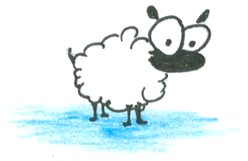“Ewan McGregor? I love him.”
We were seated on the top story of a double decker bus, not red but covered in adverts, nestled into a seat at the back and overlooking Oxford street. She was my roommate, accompanied by her boyfriend, and I was her father’s old friend’s Canadian daughter. We were discussing the theatre.
“I thought you would say that you liked him, or that he‘s a good actor.” She laughed, turning to her boyfriend for affirmation of her wit. “But no, ‘I love him,’ ‘we are meant to be together.” She spoke in a deadpan, having the good grace not to attempt an imitation of my accent. I laughed along side her, feeling slightly intimidated by her quick tongue, which was an uneasy feeling I carried throughout my time abroad. Whenever I tried to join into the gentle, observant jabbing, I ended up coming off harsh or obvious. Bless her, they’d say, she’s Canadian.
Ewan McGregor, who was not Canadian, was starring in a production of Guys and Dolls. Working in London’s West End, I walked past the posters daily. The many theatres nestled into that tiny stretch of Soho attracted American stars, like Kevin Spacey, Val Kilmer, and the lesser David Schwimmer (who my spell check insists does not exist). I thought this was interesting, and it made me feel like I was part of a time and place which might someday matter, to someone, at some distant point in time, like I regard flappers today or others think of hippies and California or old New York. My current situation would pale in comparison, but it was nonetheless an exotic feeling of cultural relevance. Wheatley, Ontario, my home town of eleven-hundred, made no such worldly claims.
Adding to this feeling was my employment, which was as an usher for Mary Poppins, an up-and-coming musical, based on the novels and the Disney movie, which had premiered that year to great reviews. Eventually, the show would be exported to Broadway, where I would see it on the Tony awards and scoff at the actress playing Mary, who paled in comparison to Laura Michelle Kelly, whose voice was more angelic and overall form simply…better. The original cast was spectacular.
I had applied to all the theatres, and shudder to think of where I might have ended up. Ushers, or front-of-house staff, as we were called, were expected to sit in for a portion of the play to ‘observe the audience’ and keep an eye out for things going horribly wrong, as things will tend to do. This inevitably exposes the usher to the play itself, over and over again, eight times a week, until you find yourself knowing every word and intonation, every understudy, and picking up bits of choreography. The songs of Mary Poppins were catchy and thus repeated nonstop in my head, but the musical experience, even on its eightieth viewing, was never completely dull. Death of a Salesman, playing down the road, couldn’t make that claim on its opening night, and I wondered how the ushers there survived, and if they were all depressed, and if they were, at least, paid a better wage for their labor. Mary Poppins was truly a godsend.
The only place I’d have rather worked would be Guys and Dolls, playing at the Piccadilly.
The theatre was smaller, dingy and cramped compared to the majesty of the King Edward and all of its red carpet glory. Because Mary Poppins was new and exciting, our audience played host to a throng of celebrities, from Britney Spears to Michael Jackson and the Israeli Prime Minister, though most before and after my employment. Guys and Dolls, older than time, would not have attracted such crowds, despite the prestige of its cast and its equally rave reviews. So, the lure of the theatre was questionable at best.
Objectively, I knew, Mary Poppins offered a better working experience during my time in London, and a conveniently quintessentially British one, to boot. Guys and Dolls offered no such perks, and even as I entered the doors of the theatre, and I saw the dark, jaded eyes of the ushers there, holding their velvet rope, I didn’t doubt it for a second. Ewan McGregor was in that theatre, and thus that theatre was the best place to be.
Getting to see the production was no easy task. I worked every evening and on afternoons for matinees, and so the only available performance was a single, weekly matinee which did not happen to overlap with Mary Poppins. Also of concern was the fact that I could not afford a ticket, which could be gauged at up to fifty pounds apiece. The only solution was to line up outside at six a.m.. Each day a row of seats for that afternoon or evening’s perform was released, at a heavily discounted rate, for those who were willing to brave the fatigue and the rain. The seats were usually considered undesirable, in rows with a limited view, and I accepted this with undeterred enthusiasm - a squinted, half-formed view of Ewan McGregor was still a view of Ewan McGregor. I waited, patiently.
A fellow Canadian coworker had joined me on this journey and, as we waiting in line, for hours, we recited the entirety of Mary Poppins, in off-key tones and imitated accents. This probably annoyed those around us, but it wasn’t as if we had a choice. The musical was our white noise, never stopping in its circulation and expanding to fill any idle moment, perfectly, intractably, until we really couldn’t help but burst into song. Besides, at least one person ahead of us had cut in line - this was their punishment.
Eventually, the doors opened, and my friend and I stepped inside and acquired our tickets, which informed us that our seats were situated near the centre of the very first row. Over a lunch of chips and spotted dick, we squeaked with glee and then told ourselves, stoically, to prepare for the worst. Front row seats are often terrible, especially if the stage is too high; the view can be cut in half or completely obscured for shorter audience members, and any use of on-stage fog leads to complete oblivion in a cloudy nightmare. I wondered if Guys and Dolls would need fog, but couldn’t be sure.
After lunch, I feigned nonchalance as we made our way back to the theatre, biting the inside of my cheeks in eager anticipation.
Arriving at our seats, we found that the stage was not too high - in fact, it was unusually low, granting us the perspective of sitting, cross-legged and stooped, directly on stage. Below was the orchestra, tuning their instruments, and I gulped. Don’t be too excited, I cautioned myself, it’s only your one chance to see the love of your life, in person, two feet away from you… Eeeeeee!
***
Perhaps I should interject here and explain myself, or at least provide some clues. My admiration for the Scottish actor nearly twice my age began with the film Moulin Rouge, a film which I happened to watch at least once a day, on my laptop, while studying for exams during the previous university semester. His character in the film is, essentially, the perfect man - the only flaw being a certain puppy-dog passivity which was easily ignored in the name of good looks, a Scottish accent, and singing ability whilst standing atop an elephant.
A short while later, after the end of exams, I discovered Trainspotting, and felt a similar desire to view the film repeatedly and let its every moment seep into the deep recesses of my subconscious. Trainspotting is far more disturbing than its musical bohemian counterpart, and despite Nicole Kidman’s death from tuberculosis, I’d never considered Moulin Rouge to be anything but a happy film. Trainspotting was not a happy film, or even a not-unhappy film, but it kept me watching, again and again, caught up in its masterfully artistic folds. Ewan McGregor was not solely responsible for the beauty and intrigue of either movie, but at the same time he could not be separated out - there is no Trainspotting or Moulin Rouge without him. His ability and commitment to his roles can, and one day will, burn down a house. The man is that good.
Admiration does not equal undying love - a love that was born with the reading of The Long Way Round, which was the co-authored memoir of the actor’s journey around the world by motorcycle with a friend. Everyone I know who has read the book has come away with the same thought: Ewan McGregor is really a great guy. Down to earth, friendly, personable, without a slimy layer of smarm or sleaze. A man who loves his wife and kids. A man who challenges prejudice, sometimes, and really just likes riding his bike into the sunset. Really, truly, the perfect man. Love.
My love is laced with tragedy, for I will never be with Ewan. Even if we were to meet, which seems unlikely given our differing social circles and continents, there would be no chance of mutual attraction. Ewan has made out with some of the hottest women of our time, and he remains deeply enraptured by his wife, who in his book he calls simply ‘my Eve.’ And even if lightning would strike, and we were to meet, and he were to find my short stature and big ears oddly alluring, still the love could never be. Ewan loving me would make him into an odd, philandering, lesser man, and I could never do that to him. Alas, my wretched, wilting heart, alas.
The closest I will ever get is staring up from an audience as he exists, enveloping Sky Masterson, in a different world two feet away. And perhaps that is close enough. I swear, during a long moment staring at the crowd, he almost looked right at me.
When we galloped back to the King Edward to get ready for that evening’s show, our fellow ushers asked us about the play, about our seats, and about the performance of Ewan McGregor. “So, basically, when he was onstage, you were within spitting distance?”
“Yes.” I beamed, proudly. “Yes, I was."
Saturday, May 30, 2009
Subscribe to:
Post Comments (Atom)





No comments:
Post a Comment